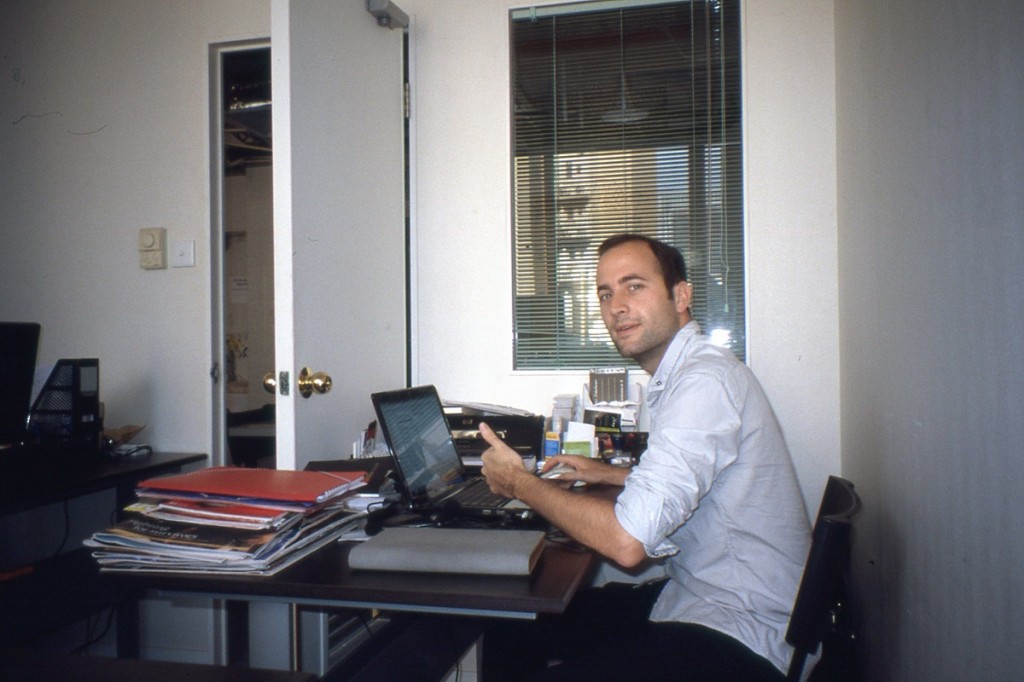We’re very happy to start running these personal profiles from Hong Kong entrepreneurs to share their stories with the local community. We’ve known Cedric Delzenne since the beginning of StartupsHK and we’re very honoured to have him talk about his experiences in running a startup.
Note from the guest author Cedric Delzenne: The following tips are based on my experience launching and running ShopDesCreateurs.com for nearly 4 years. Comments and different opinions are of course most welcome!
1. Be very clear about your personal goals
Running a 1-person online education business is not exactly the same as developing Udemy. There is no good or bad, and both can be profitable.
However as a founder you need to be clear and honest with yourself and others: are you launching a business to be your own boss and manage your schedule the way you want, or to build the next big thing (that hopefully you will be able to sell in a few years)? Your answer will impact your life for the next 10 years.
Also don’t only do it for the money. Chances for you to become rich in a few years are very slim. You will most likely experience a few highs and a lot of lows before having a multi-million dollar company, so choose an industry and a concept that you are truly passionate about.
2. Talk about your business
First-time entrepreneurs are typically wary of talking about their business idea, fearing that people (friends, potential investors or customers) will copy it. This is a miscalculation for two reasons:
- Either people don’t care about your idea, or think it won’t work.
- Or they like it but are too busy with their own job or agenda, or are just not interested in starting their own business.
Being in “stealth mode” too long is probably the biggest mistake that entrepreneurs can do. The risk of launching an irrelevant business as a consequence of not seeking feedbacks early on is actually far greater than the risk of being copied. And even if you are, it’s all about execution.
3. Don’t start alone
It might be difficult to find someone ready to embark with you on the long and difficult journey of entrepreneurship but you should at least give it a try, by leveraging on your network, attending relevant meetups or posting on job boards for start-ups. I see two main reasons why having a co-founder is often the key for success:
- If you know that your business will require funding at some point, remember that investors typically invest on a team rather than a young company, whose business model will most likely need to evolve a few times.
- Launching your own business is probably the most difficult thing you will do in your professional life. Co-founders are able to motivate one another, brainstorm and bring complementary skills to the table.
However choose your co-founder wisely, as it might break your business as well. There are countless examples of promising start-ups that crashed because of founders who couldn’t get along anymore, turning best friends into worst enemies. In any case, avoid splitting equity 50/50.
4. Don’t start with no money at all
“It takes money to make money”. That’s why seed funding and crowdfunding exists. We are lucky enough to be in Hong Kong, where incorporation, website development, office space are relatively inexpensive. But growing a customer base is not cheap, even with the best growth hacking techniques.
In addition, don’t forget about your opportunity costs: how much would you earn with a corporate job? How long can you last with a small or no salary at all? How long are you ok to work your XXX off for free, even it’s your own company?
5. Start your day with exercise
You will need to stay fit if you want to last more than 6 months working countless hours, weekends and holidays included. 40 minutes of any sport in early morning with the music you love will clear your brain and fill you up with positive energy.
Start a business and you will quickly find yourself overwhelmed by the amount of (urgent) things that must be done, so use that time to master chaos by planning your day and setting goals. Execution is also about how productive and efficient you are 14 or 15 hours a day.
6. Commute to work
As an entrepreneur, you shall be knowledgeable about all facets of your industry (for example fashion, financial services, travel etc…) AND specialty (mobile-only, big data, social media etc…). And for that you need to read and share insights with your peers as much as you can.
The best way to keep an hour per day for reading is commuting. Don’t choose your office as close to home as possible just because you can sleep 15 minutes longer!
Use your commuting time to learn and share valuable content on Linkedin, Twitter or any other relevant platform, showing your peers that you know what you are talking about, building your personal brand along the way. If you do this right and consistently, journalists and event organizers might even contact you for interviews or speaking opportunities.
7. Don’t work from home
For the same reasons and also because as an entrepreneur you shall not be isolated, don’t work from home more than a few weeks after deciding to launch a business.
Pick the co-working space that will best match with your brand positioning (geeky vs. stylish) and your location (not too close from home!) and mingle. You might well find your co-founder or freelance graphic designer there. You will also benefit from a positive work atmosphere, convenience and avoid too many distractions.
8. Be super organized
No matter how productive you are at work, you will have to deal with more things that you can possibly do in a day. Work with milestones and try to filter and prioritize projects or tasks by asking yourself (and your team) the following question: how much visibility, revenue, or credibility does it generate to my business?
Because business in most industries is very much about building relationships (with your clients, partners, potential investors, journalists or bloggers etc…), entrepreneurs should not spend more than half of their time in the office.
However meetings take time, even in Hong Kong. Learn to say no to meeting requests if you think a quick phone call is enough, always reconfirm meetings, and try to get what you want in 45 minutes so you have just enough time to jump into a taxi to your next meeting.
9. Get some sleep
All entrepreneurs wish a day had 48 hours. But remember that we are humans and sometimes need a rest. If you don’t, your body will remind it to you at some point and it can be nasty.
Starting and running a business is an incredible experience but don’t put your health (and productivity) at risk.
I personally need a minimum of 7 hours of sleep. Decide what is a good time to go to bed for you (midnight sounds reasonable) and stick to it.
10. Don’t overlook the admin stuff
Even in Hong Kong where the legal and admin frameworks are quite light, there are a few things that you need to know as a business owner. Get informed on governmental websites and don’t wait for the last minute to deal with accounting, annual return, MPF, visa renewal etc…
Keep a few hours per week to sort your admin stuff and you will save yourself a lot of unnecessary stress (and reminders from your comp sec or bank). Or pay someone to do it for you if you can afford it.
11. Set proper accounting from the start
Accounting is not the most exciting task for an entrepreneur and you can outsource it. But understanding your revenue & cost structure from Day 1 (even before launch) is critical, for yourself as a business owner of course, and also for future investors who will request that type of information during the due diligence process. Drive your finances on intuition and you will drain your resources before you know it!
12. Spend half of your time analyzing data
Beyond financials, most strategic decisions you make shall rely on reliable, filtered, analyzed data (whether public such as market reports, or generated by your company such as Google Analytics, customer surveys, social media monitoring etc…).
There are plenty of tools available (most of them free or inexpensive) to help you visualize where your business stands, what marketing campaign or media is the most effective and focus on what works best. Don’t rely only on your intuition.
13. Hire only the best
In an increasingly complex world, an entrepreneur cannot be great at everything. A rule of thumb is to hire people who are smarter than you and ideally people who don’t need to be managed.
In any case, never hire by default (thinking he/she will learn along the way), even for entry-level positions. Learning by doing is a long-term process that might be suitable for bigger companies but is not aligned with the need for speed of early-stage companies. As a founder you won’t be able to spend more than a few hours per week on training your staff either.
14. Don’t waste your time with print media
Running a business is all about ROI. Courting journalists from traditional media for free press coverage is very tempting, especially if your start-up is B2C. However it is also very time-consuming and you will have a hard time isolating and measuring the impact of a product feature or interview on your bottom line. Focus on online media instead.
That being said, being featured in the Financial Times or Marketing Magazine is great for branding (and your self-esteem) so make yourself available to unsolicited interview requests.
15. Learn about growth hacking
Let the privilege of spending large amounts of money in advertising and events to large firms and keep your start-up lean. Be smart and use each dollar as if it was your last. Because one month left of cash flow at the bank might well be the time you need to pivot and save your start-up from bankruptcy.
There are dozens of ways to build your audience for free (not including your own time or your staff’s), including guest posting on your industry’s authoritative sources, assisted virality, giveaways on 2nd tier blogs (1st tier blogs will charge for that), content syndication, piggybacking etc… [Click here for a must-read on growth hacking.]
16. Don’t raise money unless you are in a position to negotiate
Don’t look for investors because it is cool to raise money and good for your ego. Many businesses don’t need external funding. If yours does, don’t wait till you have got one month cash flow left at the bank. Fundraising is one of the most time-consuming activities for founders and can easily distract you from what really matters: building traction and serving customers. The very minimum timeframe to secure a seed round is 3 months from the first meeting.
The paradox about fundraising is that investors you will proactively contact know that you are not in a position to negotiate the terms. Some will play it fair with you, knowing that you will quit sooner or later if the terms don’t protect your financial interests, but others might squeeze everything they can from the deal in the hope of a higher return.
Ideally, your start-up will have enough traction and media coverage or buzz to attract investors. Networking in the right places and pitching to the right people (investors themselves or connectors) in a subtle way might also help to get the attention of BAs or VCs without begging for money.
17. Stay away from banks
Running a business is stressful enough not to depend on financial institutions that will 1. Require collaterals, putting your personal life (and possibly your family) at risks and 2. Let you down when you really need them.
Business angels and VCs typically spread their risks by investing on 10 start-ups, knowing that 1 will be large enough a success in the long term to cover their loss with the 9 others. Good ones also know that most start-ups need at least 2 or 3 years to find a good market fit and will confirm their support through tough times – unless they realize that they bet on the wrong horse and decide cut their loss early.
18. Fake it until you make it
Even if you think your business has no competition (which is never true by the way), time is not on your side and you will need to make your way to a market leading position quickly. It is OK to bolster your figures a little when trying to sell to or to build a partnership with a larger company, or when pitching to the media (not to investors though).
It is public knowledge that now-famous Reddit has applied this principle to some extremes, creating fake accounts on their own platform to ignite their organic growth of audience.
19. Don’t spread your resources too thin
When you realized that you need more time to break-even on your initial business model, you might be tempted to launch a new service or product to add up revenues. It might be a great idea if your start-up is well funded, allowing you to invest in product development, human resources and marketing.
If it’s not, this strategy might well put your initial business at risks by re-assigning part of your already limited resources to a new activity. As a start-up you will need to focus all your resources on a single objective. If that does not work out, it is probably time to pivot.
20. Remember the simple pleasures of life
Once you start, there will be nothing more important than your start-up. You will constantly think about it, speak about it, and dream about it at night. The frontier between your professional life and personal life will blur. Your smartphone will be riveted to your hand.
This is passion and that is what makes the entrepreneurial journey so unique and exciting.
However the journey is long, difficult and your unconditional commitment will inevitably impact your relationships with your loved ones, even the most supportive boyfriend or girlfriend.
Set some simple rules such as eating out at least once a week with your friends or family, no smartphone in bed, or limiting work to one hour per day during your holidays (because you will need a break sometimes too). This will help you keep your sanity, relieve stress and nurture love and happiness around you.
Cedric is now the director at the Hong Kong chapter of entrepreneur training / startup launch program Founder Institute, and an active member of the local startup scene.


